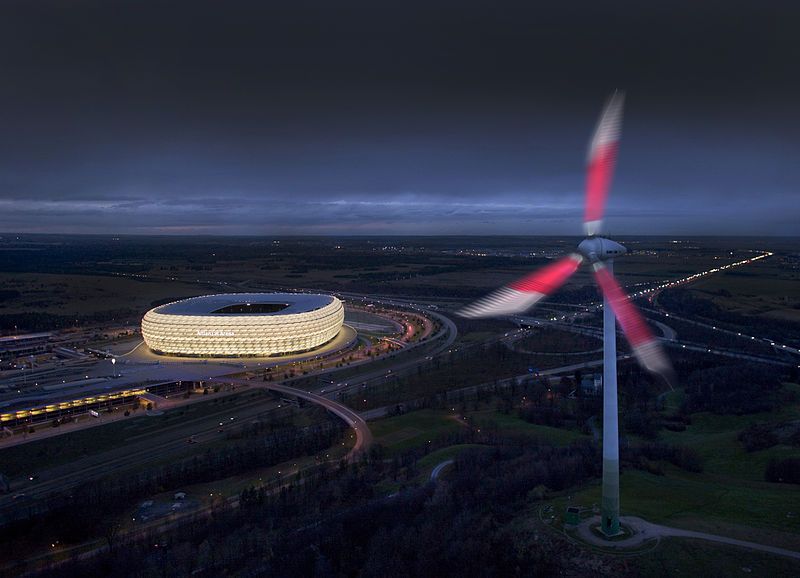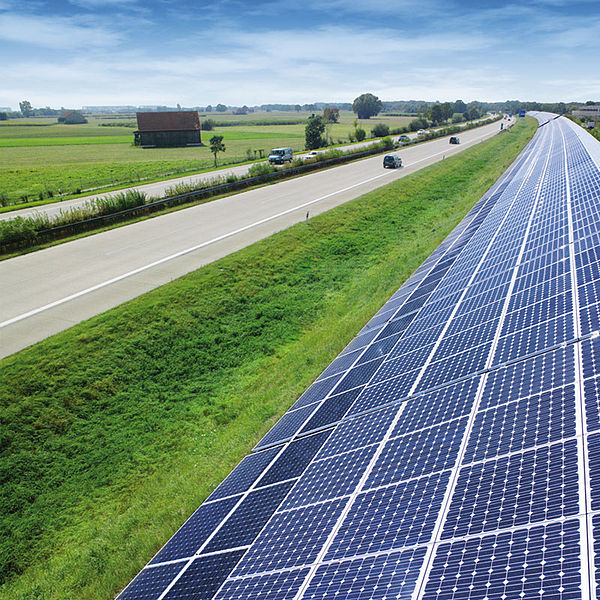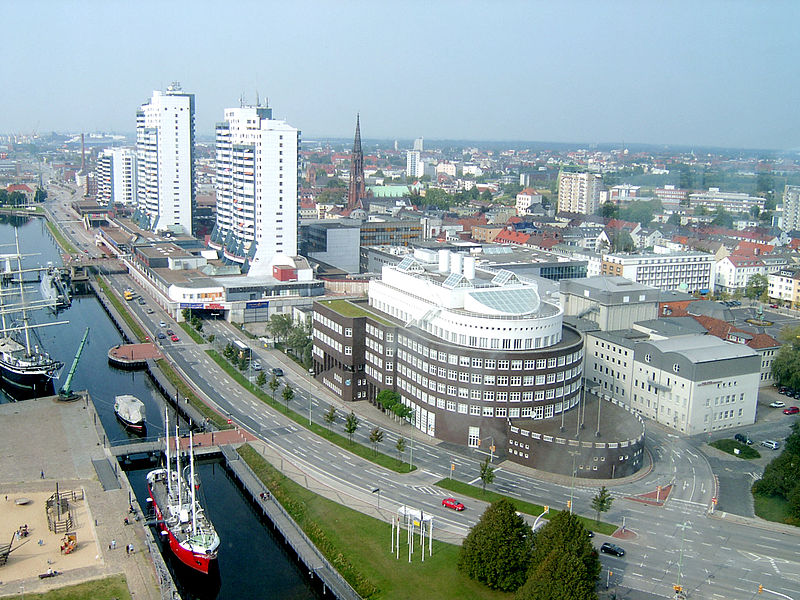Transformation of Germany’s energy system
Climate change poses enormous challenges. We will have to drastically change our economic practices if we want to leave the bases of peace and prosperity intact for future generations. And yet, advocates of climate action often face opposition from those who are worried that an ambitious climate policy will necessarily lead to economic losses. We need to take these concerns seriously, but I am absolutely positive that we have good arguments to convince critics of the benefits.

Climate action is more than a mere reaction to the threat of climate change. I consider climate action to be a precautionary policy for both the ecology and the economy. We all know about the dangers of climate change, and they are tremendous. While the impacts will vary greatly from region to region, no country on Earth will be able to entirely avoid problems such as water scarcity, increased occurrence of extreme weather events, rising sea levels or the destruction of ecosystems.
If we want to prevent the average global temperature from rising by more than 2° C compared with pre-industrial levels, it will not suffice for individual countries or groups of countries to reduce their emissions. Each and every country will have to contribute to climate action in line with its responsibility and capacity. We will need to be persistent to win them over. Our motivation is to prevent damage brought about by climate change, and as industrialised nations we have a great responsibility - which we are willing to take on. But climate action is not only our duty to future generations, it is also an aspect of a sensible, precautionary and sustainable economic policy.
Strong global trends, for instance unchecked energy demand and the consequent consumption of coal, oil and gas, the looming climate crisis and a growing world population make proper climate policy the sustainable motor for growth of the 21st century. Success will only come to those who can gain independence from the fluctuating world prices of fossil fuels and invest early on in efficient climate-friendly and environmentally sound technologies. We need to make greater use of the potential for innovation and modernisation offered by environmental and efficiency technologies. That will be the decisive factor for our competitiveness in future. These are the economic opportunities offered by climate action.
"Energiewende" - transforming Germany's energy system
 Germany wants to grasp these opportunities and realise its goal of achieving a reliable, affordable and environmentally sound energy supply by transforming its energy system. With regard to climate this means that we want to reduce our greenhouse gas emissions by 40 per cent by 2020 compared with the base year 1990, by 55 per cent by 2030, by 70 per cent by 2040 and by 80 to 95 per cent by 2050. Although we will need to increase efforts to reach our target for 2020, Germany is already well on the way. The measures adopted so far will allow Germany to cut its emissions by 36 per cent by 2020. This progress confirms our belief that this transformation is the right approach, also with a view to mitigating climate change.
Germany wants to grasp these opportunities and realise its goal of achieving a reliable, affordable and environmentally sound energy supply by transforming its energy system. With regard to climate this means that we want to reduce our greenhouse gas emissions by 40 per cent by 2020 compared with the base year 1990, by 55 per cent by 2030, by 70 per cent by 2040 and by 80 to 95 per cent by 2050. Although we will need to increase efforts to reach our target for 2020, Germany is already well on the way. The measures adopted so far will allow Germany to cut its emissions by 36 per cent by 2020. This progress confirms our belief that this transformation is the right approach, also with a view to mitigating climate change.
Our new direction in energy policy is based on two pillars, namely expanding renewable energy and increasing energy efficiency. For this purpose, Germany is implementing a smart mix of economic measures such as emissions trading, regulations, support programmes and targeted consultancy and information. There is, for example, the modernisation of buildings. The great potential to save energy in the building sector has not been fully tapped, especially with regard to existing buildings. We need to create incentives for the energy-related modernisation of buildings in order to take full advantage of this potential. Energy standards, for instance for new buildings, establish a framework for greater energy efficiency in buildings. In the long run we want to achieve a virtually climate-neutral building stock.
"Last year, renewables achieved the leap from niche product to the second most important energy source in Germany"
The German government has also set itself ambitious targets for the renewable energy sector. The share of renewables in gross electricity generation has risen from 17 to almost 23 per cent since 2010. We aim to raise this percentage to 35 per cent by 2020 and to 80 per cent by 2050, while phasing-out the use of nuclear power by 2022. Last year, renewables achieved the leap from niche product to the second most important energy source in Germany. They are second only to lignite and have overtaken nuclear power. That has triggered investments totalling around €20 billion, and approximately 146 million tonnes of CO2 have been avoided in Germany so far.
The main reason behind this development is the Renewable Energy Sources Act. This act has given a boost to many technologies, and photovoltaics in particular, worldwide and thus lowered the costs much more swiftly than anticipated. Only a few years ago, a kilowatt-hour of solar power cost between 32 and 43 cents (depending on the size of the facility). Today it is a mere 11 to 16 cents. There are also other support programmes, for instance the market incentive programme (MAP), which provide government assistance for private investment in renewable energy facilities that generate electricity and heat. They are important instruments which effectively supplement emissions trading as key element of climate policy.
Climate action as a sustainable strategy for growth
.jpg) The Energiewende is Germany's response to climate change and the challenges of a modern energy supply. Expanding the share of renewable energy and supporting energy efficiency is part of this climate policy concept. But it does not end here. We are also ensuring a successful transformation of the German economy to a low-carbon economy which continues to promote growth and employment. We are already reaping the benefits today. The markets for environmental technologies and resource efficiency have proven to be a motor for employment in Germany. The number of jobs in the renewable energy sector alone more than tripled between 2004 and 2012. In 2012, 378,000 people were employed in this sector in manufacturing, maintenance, administration and research.
The Energiewende is Germany's response to climate change and the challenges of a modern energy supply. Expanding the share of renewable energy and supporting energy efficiency is part of this climate policy concept. But it does not end here. We are also ensuring a successful transformation of the German economy to a low-carbon economy which continues to promote growth and employment. We are already reaping the benefits today. The markets for environmental technologies and resource efficiency have proven to be a motor for employment in Germany. The number of jobs in the renewable energy sector alone more than tripled between 2004 and 2012. In 2012, 378,000 people were employed in this sector in manufacturing, maintenance, administration and research.
The positive effects of increasing investments in renewable energy outweigh negative effects of substitution, tighter budgets due to fewer investments in conventional generation and temporarily higher prices for electricity. Models predict positive effects on net employment of more than 140,000 additional jobs by 2030 compared with a scenario that does not take into account the developments in the renewable energy sector. Higher prices for fossil fuels may actually lead to the creation of even more jobs.
Enhancing efficiency will also have positive effects on the economy. The additional jobs expected to be created through further efficiency measures will add up to about 130,000 per year from 2020. There are impressive figures for the environmental sector overall as well. Here, an increase from currently 1.4 million to 2.4 million jobs is expected by 2025.
For many German companies the transformation of the energy system is already a success. The switch to sustainable energy has created new markets for green technologies in Germany, which in turn has helped German companies establish a strong competitive position with a 15 per cent share in the rapidly growing global market for green technologies. Increasing scarcity of resources and worldwide growing energy demand mean that this market will continue to expand, even if driven only by the economic interests of businesses and households. According to Roland Berger Strategy Consultants, German companies in the environmental technology and resource efficiency sector expect an average growth of 10.6 per cent up to 2015.
"The switch to sustainable energy has created new markets for green technologies in Germany"
This trend offers a plethora of opportunities. For one thing, the regional added value is strengthened, for example through energy upgrades for buildings. Also, German companies have greater opportunities to export, as global investments in green technologies are on the rise. In order to remain successful at international level in the long term, companies have to be innovative. Investments in research and development are indispensable. German enterprises are leading the way in this respect with smart, innovative processes and products ranging from climate-friendly cement to lifestyle products entirely produced from recycled materials which fulfil the highest standards of functionality and design.
The German Energiewende already shows that economic prosperity and climate policy are not mutually exclusive. But this move to a new energy era is also a learning process. We want to include our citizens in this process in order to continue the success. Only joint efforts will help us achieve our goals. After all, we all depend on the resources that we want to safeguard through the ecological modernisation of Germany.
The German Energiewende as a contribution to international climate action
Germany is aware of its responsibility for climate change as an industrialised country and is taking action by entering a new energy era. Considering, however, that Germany is responsible for less than three percent of global CO2 emissions, one thing is clear: We need to encourage other countries to choose the path to a low-carbon economy. This is why we endeavour to inspire others in the context of UN climate negotiations and bilateral cooperation.
Although the UN climate process is not as swift in achieving concrete results as I would like, it is nevertheless the main forum to make real progress worldwide, as it is the one platform where major emitters and the countries most strongly affected by climate change get together. Only here can legally binding agreements be adopted. We are currently working on the adoption of a legally binding climate agreement for all countries in 2015. It is an important opportunity to expand the international climate regime and make it more effective, and we need to seize it. In contrast to the Kyoto Protocol, which only contains binding reduction obligations for industrialised countries, this new climate agreement will be the first to obligate all countries to reduce emissions.
In 2015, we will have to adopt an agreement that is not simply the lowest common denominator. That would not be sufficient to prevent global warming of more than 2°C.
"The Energiewende has become a German trade mark and meets with great interest"
Although the UN process is lagging, the transformation of the German energy system is drawing a lot of international attention and inspiring other countries. The Energiewende has become a German trade mark and meets with great interest. The number of countries undertaking similarly ambitious projects is continuously growing. To give only a few examples: Costa Rica and Maldives have committed to establishing carbon-neutral economies. Brazil announced that official estimates of deforestation for 2012 were at the lowest annual level by far since satellite measurements started in 1988.
Saudi Arabia has launched one of the most ambitious solar energy programmes, with investments adding up to more than US$100 billion. California entered the first commitment period under its emissions trading scheme this year. There is good news from China, too. The current five-year-plan includes concrete climate policy targets for reducing emissions intensity, increasing the share of non-fossil fuels and raising energy efficiency.
Despite the fact that we still need to do more, these examples are encouraging. They show that there is a worldwide recognition that climate action and sustainable economic growth go hand in hand. If we want to encourage more countries to strive for a low-carbon economy and adopt an ambitious global agreement in 2015, it is crucial that Germany and Europe do not slacken in their efforts and continue to spearhead climate action and the switch to sustainable energy structures.
Pursuing our goal
Germany has announced emission reductions by 40 per cent by 2020 and 55 per cent by 2030, and I advocate that we also lay down an ambitious reduction target for the EU. The goal is clear: Compared to 1990, the EU wants to achieve an 80 to 95 per cent reduction by 2050. It is in our own interest as Europeans to set an example of how commitment to climate action offers opportunities for new, sustainable growth.
"Climate action offers opportunities for new, sustainable growth"
During the current crisis we can, now more than ever, demonstrate how the private sector can be included through incentives in order to achieve a low-carbon economy and make use of the opportunities it entails. To accomplish this, we need to reform the emissions trading scheme, Europe's most important climate instrument, in such a way that it can once again send out genuine price signals and thus provide incentives for climate-friendly investments. This is the only way for Europe to remain at the forefront of climate action and encourage other countries to undertake similar efforts.
The fact that a successful industrialised country like Germany is convinced that it can transform its economy into a low-carbon one sends a strong signal. That is why I am dedicated to the transformation of our energy system, and I hope that we can motivate other countries to initiate similar projects. To 
The common goal of the club members, i.e. Germany, Denmark, France, the United Kingdom, Morocco, South Africa, India, China, Tonga and the United Arab Emirates is to advance the expansion of renewable energy worldwide. We want to set a good example and encourage other countries to join us. We all share the vision of renewable energy taking on a leading role in the future worldwide energy supply. Together we will work to achieve this goal.
There are great synergies between combatting climate change, renewable energy and energy efficiency. We will not be able to reach our climate targets without renewable energy or efficiency. That is why these two aspects are central pillars of our Energiewende. The combination of renewable energy and energy efficiency is and will remain our best option to keep our energy supply secure and affordable.
This cannot be done overnight but requires a carefully coordinated process of many years until all parts fit together perfectly. And this is the actual challenge, but also a unique opportunity to strengthen Germany as a centre for business and innovation. We need a new competence for the entire energy system that goes far beyond expertise in individual technologies and that will define our country's future competitiveness. We will not miss this great opportunity to combine climate action with a sustainable strategy for growth.








